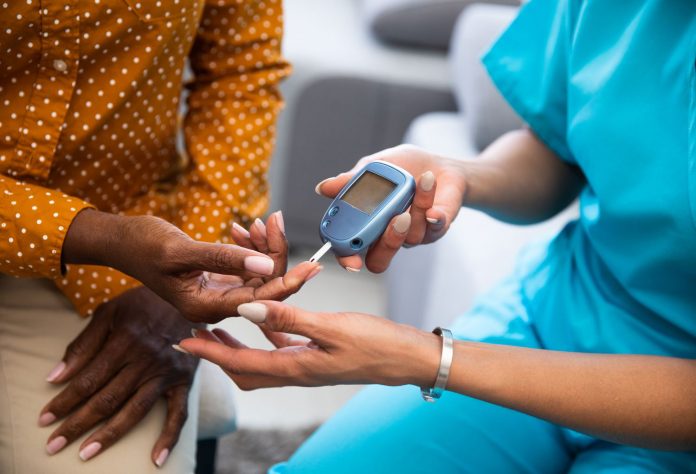Diabetes mellitus is a metabolic disease that causes high blood sugar. Your body either doesn’t make enough insulin or can’t effectively use the insulin it makes
The hormone insulin moves sugar from the blood into your cells to be stored or used for energy. If this malfunctions, you may have diabetes.
Untreated high blood sugar from diabetes can damage your nerves, eyes, kidneys, and other organs. But educating yourself about diabetes and taking steps to prevent or manage it can help you protect your health.
Types of diabetes
There are a few different types of diabetes:
Type 1: Type 1 diabetes is an autoimmune disease. The immune system attacks and destroys cells in the pancreas, where insulin is made. It’s unclear what causes this attack.
Type 2: Type 2 diabetes occurs when your body becomes resistant to insulin, and sugar builds up in your blood. It’s the most common type—about 90% to 95%Trusted Source of people living with diabetes have type 2.
Type 1.5: Type 1.5 diabetes is also known as latent autoimmune diabetes in adults (LADA). It occurs during adulthood and sets in gradually like type 2 diabetes. LADA is an autoimmune disease that cannot be treated by diet or lifestyle.
Gestational: Gestational diabetes is high blood sugar during pregnancy. Insulin-blocking hormones produced by the placenta cause this type of diabetes.
A rare condition called diabetes insipidus is not related to diabetes mellitus, although it has a similar name. It’s a different condition in which your kidneys remove too much fluid from your body.
Each type of diabetes has unique symptoms, causes, and treatments.
Prediabetes
Prediabetes is the term that’s used when your blood sugar is higher than expected, but it’s not high enough for a diagnosis of type 2 diabetes. It occurs when the cells in your body don’t respond to insulin the way they should. This can lead to type 2 diabetes down the road.
Experts suggest that more than 1 in 3 have prediabetes, but over 80%Trusted Source of people with prediabetes don’t even know it.
Symptoms of diabetes
Diabetes symptoms are caused by rising blood sugar.
General symptoms
The symptoms of type 1, type 2, and type 1.5 (LADA) are the same, but they occur in a shorter period than types 2 and 1.5. In type 2, the onset tends to be slower. Tingling nerves and slow-healing sores are more common in type 2.
Left untreated, type 1, in particular, can lead to diabetic ketoacidosis. This is when there is a dangerous level of ketones in the body. It’s less common in other types of diabetes, but still possible.
The general symptoms of diabetes include:
increased hunger
increased thirst
weight loss
frequent urination
blurry vision
extreme fatigue
sores that don’t healing
Symptoms in men
In addition to the general symptoms of diabetes, men with diabetes may have:
Women with diabetes can have symptoms such as:
vaginal dryness
urinary tract infections
yeast infections
dry, itchy skin
Gestational diabetes
Most people who develop gestational diabetes don’t have any symptoms. Healthcare professionals often detect the condition during a routine blood sugar test or oral glucose tolerance test, which is usually performed between the 24th and 28th weeks of pregnancy.
In rare cases, a person with gestational diabetes will also experience increased thirst or urination.
Diabetes symptoms can be so mild that they’re hard to spot at first. Learn which signs should prompt a trip to the doctor.
Causes of diabetes
Different causes are associated with each type of diabetes.
Type 1 diabetes
Doctors don’t know exactly what causes type 1 diabetes. For some reason, the immune system mistakenly attacks and destroys insulin-producing beta cells in the pancreas.
Genes may play a role in some people. It’s also possible that a virus sets off an immune system attack.
Type 2 diabetes
Type 2 diabetes stems from a combination of genetics and lifestyle factors. Having overweight or obesity increases your risk, too. Carrying extra weight, especially in your belly, makes your cells more resistant to the effects of insulin on your blood sugar.
This condition runs in families. Family members share genes that make them more likely to get type 2 diabetes and to be overweight.
Type 1.5 diabetes
Type 1.5 is an autoimmune condition that occurs when the pancreas is attacked by your own antibodies. as in type 1. It may be genetic, but more research is needed.
Gestational diabetes
Gestational diabetes occurs as the result of hormonal changes during pregnancy. The placenta produces hormones that make a pregnant person’s cells less sensitive to the effects of insulin. This can cause high blood sugar during pregnancy.
People who are overweight when they get pregnant or who gain too much weight during pregnancy are more likely to get gestational diabetes.
Both genes and environmental factors play a role in triggering diabetes.





























